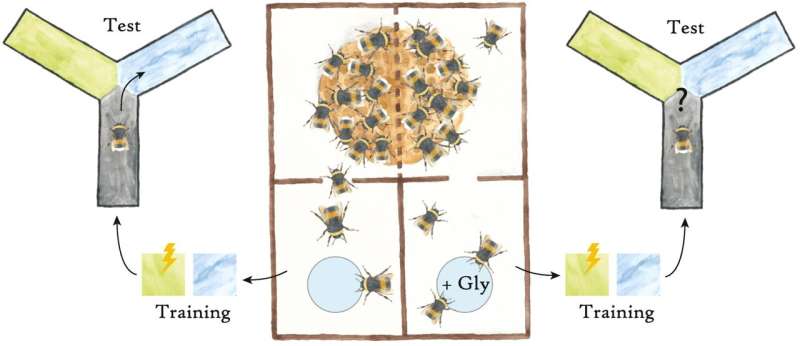This article has been reviewed according to Science X's editorial process and policies. Editors have highlighted the following attributes while ensuring the content's credibility:
fact-checked
peer-reviewed publication
trusted source
proofread
Study shows glyphosate impairs learning in bumblebees

What impacts do agrochemicals have on the ongoing global insect decline? Biologists at the University of Konstanz have found out that aversive learning is impaired in bumblebees exposed to glyphosate. Their study is published in the journal Science of the Total Environment.
"With global insect decline going on at alarming rates, we have to examine the contribution of agrochemicals more closely, going beyond mere assessment of mortality rates," says Morgane Nouvian, biologist and fellow at the Zukunftskolleg (Institute for Advanced Study for early career researchers) at the University of Konstanz.
With Anja Weidenmüller and James J. Foster she investigated the impact of long-term exposure to glyphosate on locomotion, phototaxis—that is the movement in response to light—and learning abilities in bumblebees. For the researchers, non-lethal effects on fitness are equally important to insect conservation as lethal ones, as they can reduce an individual's chances at reproduction and survival.
A year ago, Weidenmüller had discovered that the collective thermal behavior of bumblebee colonies that have been chronically exposed to glyphosate is affected when resources become scarce. Studying their ability to regulate the temperature of their brood, she found that these bumblebees cannot keep their brood warm for as long. And she warned that if they cannot maintain the necessary brood temperature, their brood will develop more slowly, or not at all.
Absence of aversive learning
In their current study, the biologists tested more than 400 bumblebee workers. The Konstanz scientists demonstrate that bumblebees chronically exposed to glyphosate cannot associate a possible threat (aversive stimulus) with a visual cue during a differential learning task. "As far as we can see, they don't learn at all anymore," Nouvian says.
In contrast, a control group of bumblebees that had not been exposed to glyphosate showed good aversive learning abilities. "The ability to associate a noxious stimulus with particular cues is a fundamental pre-requisite for survival," says Nouvian.
"Through this adaptive behavior, animals have a better chance of avoiding encounters with poisons, predators and parasites. This is why the learning impairment that we have demonstrated, caused by exposure to glyphosate, could substantially increase the mortality rate of foragers. Such depletion of the workforce would have an obvious impact on colony success, although this remains to be confirmed experimentally," she says.
As for the experiments on locomotion and phototaxis, glyphosate exposure slightly reduced the bumblebees' walking speed but only while they habituated to the training apparatus, and left the phototactic drive largely unaffected. However, it reduced attraction to ultraviolet light if compared to blue light.
In their study, the biologists warn that even a slight shift in UV sensitivity could have broad implications for these pollinators, potentially affecting their navigation and their foraging efficiency.
Risk assessment put to test
Glyphosate is currently approved for use in the EU until 15 December 2023, when decision-making on the Glyphosate Renewal Group's (GRG) application for renewal is to be finalized according to information from the European Community website.
On 6 July 2023, the European Food Safety Authority (EFSA) published a press release concluding it "did not identify any critical areas of concern in its peer review of the risk assessment of the active substance glyphosate in relation to the risk it poses to humans and animals or the environment." At the same time, EFSA reported "some data gaps […] as issues that could not be finalized or outstanding issues […]."
Concluding their study, the scientists proposed their assay—the so-called yAPIS, a fully automated, high throughput apparatus—as a method to investigate the impact of agrochemicals on insects, especially pollinators, more systematically.
In particular, this approach could complement the mortality rates assessments that are currently used to evaluate the toxicity of agrochemicals, by providing data about their potential non-lethal effects.
More information: Morgane Nouvian et al, Glyphosate impairs aversive learning in bumblebees, Science of the Total Environment (2023). DOI: 10.1016/j.scitotenv.2023.165527
Journal information: Science of the Total Environment
Provided by University of Konstanz


















